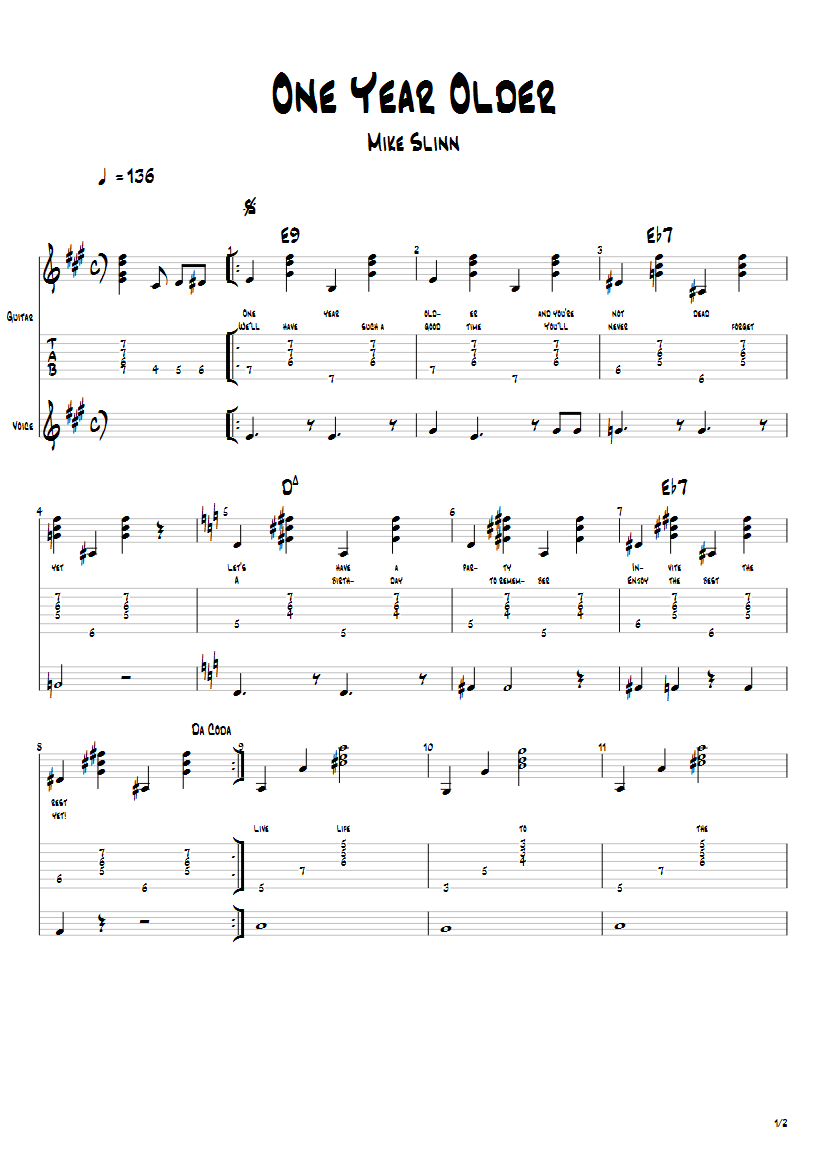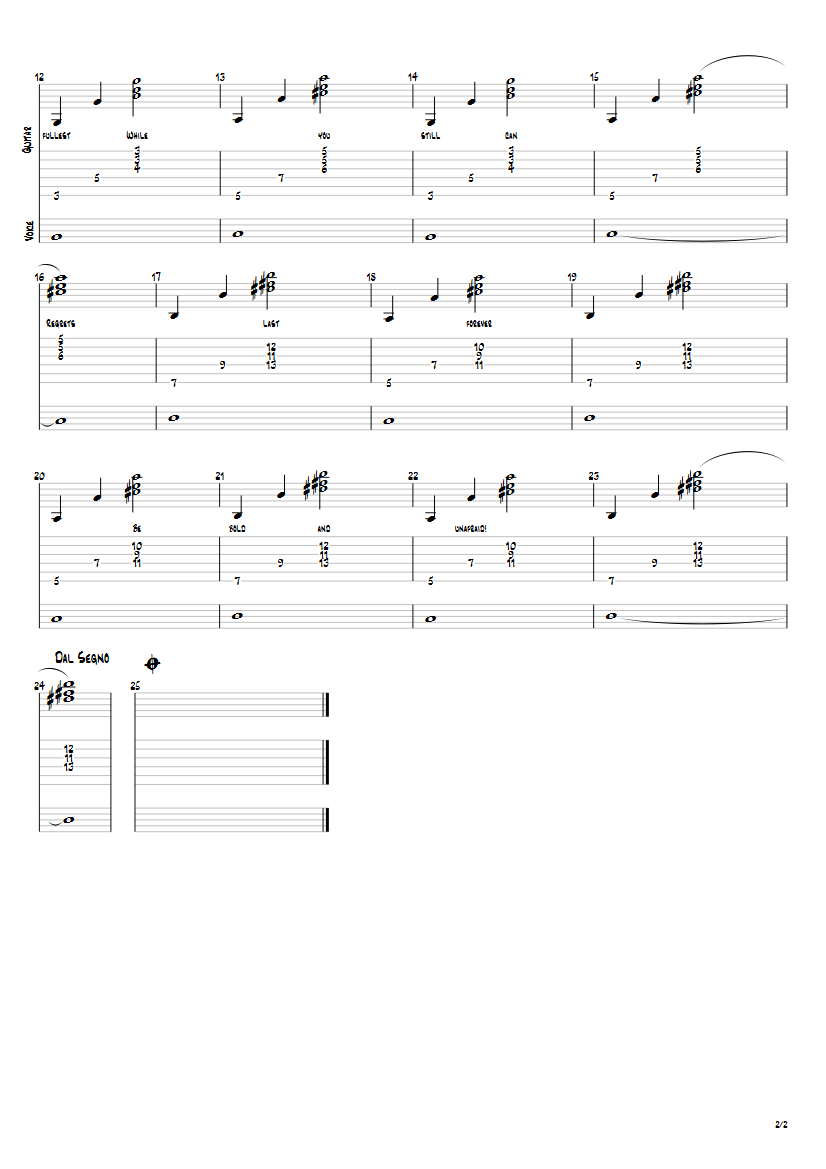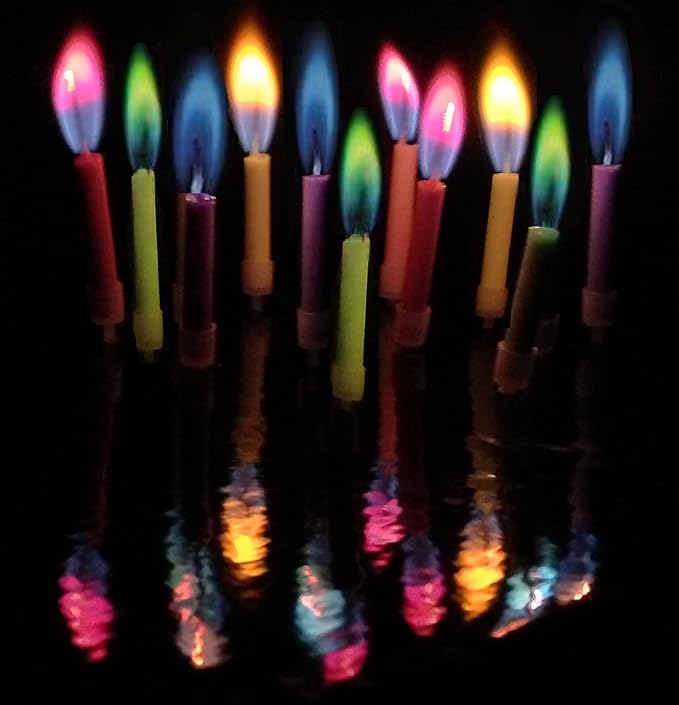Published 2022-11-02. Last modified 2025-02-26.
songs collection.

© Chords circa 2018; original lyrics 2022-11-02; third verse added 2023-04-15; French lyrics added 2024-08-13. An original composition by Mike Slinn. All rights reserved.
This song was recorded in the key of A and is probably best played at 136 BPM.
About This Song
“Happy Birthday to You” is a nice song, and very well known. “One Year Older” is a bouncier and more poignant celebration of another year of life. This song is essentially an expression of Optimistic Nihilism.Music Videos
The following video is the longest version, at 2 minutes and 20 seconds, and has all the parts of the song in it. This version of the song is played at 136 bpm. Verse 1 repeats three times, with a little scat singing between the first two repeats, and verse 2 occurs between the last two repeats of verse 1:
The following video is a 60-second version, also played at 136 bpm. Verse 1 is followed by scat singing, followed by a fade. In this version, verse 1 does not repeat, and verse 2 is not included.
Audio Recordings
Raven Nostra made the following mix from previous recordings. Sounds much better!
One Year Older-xx_sec_136_bpm_2025-07-30.mp3The following MP3 recording adds a second guitar part to the previous audio file, which fills the sound out nicely without being obvious. Everything else is identical.
One Year Older 136 bpm 2024-12-21.mp3The following MP3 recording, at 136 bpm, is the audio portion of the first video. This audio recording is a few seconds shorter than the video recording because the audio recording has no trailer. This is the longest version of the song at 136 bpm.
One Year Older-2_min_27_sec_136_bpm_2024-11-05.mp3The following MP3 recording is identical to the previous MP3 recording, but is about a minute shorter because verse 2 is not present, and verse 1 only repeats once:
One Year Older-1_min_31_sec_136_bpm_2024-11-26.mp3The following MP3 recording is identical to the first MP3 recording, but is three seconds shorter because the interlude with the scat singing is not present, and verse 1 only repeats once:
One Year Older-1_min_28_sec_136_bpm_2024-11-26.mp3The following 55-second MP3 recording is the audio portion of the 60-second video. It also was recorded at 136 bpm. This audio recording is a few seconds shorter than the video recording because the audio recording has no trailer. This version merely consists of verse 1, following by the interlude with scat singing, to fade:
One Year Older-55_sec_136_bpm_2024-11-26.mp3The following MP3 recording just consists of verse 1, at 136 bpm:
One Year Older-38_sec_136_bpm_2024-11-26.mp3The following MP3 recording is the longest and slowest version. It is actually identical to the first MP3 recording, but recorded at 120 bpm:
One Year Older 120 bpm 2024-11-02.mp3The following MP3 recording is the shortest version. This 1.5-second sound bite just consists of me singing the words "One year older" over the music, played at 136 bpm.
One Year Older 1.5 seconds 136 bpm 2024-10-28.mp3Lyrics
One year older
And you’re not dead yet
Let’s have a party
Invite the rest
We’ll have such a good time
You’ll never forget
A birthday to remember
Enjoy - enjoy - enjoy the best yet!
Live life to the fullest
While you still can
Regrets last forever
Be bold and unafraid!
Videos
I have prepared several videos of this song; some are music videos for viewing and listening, while others are instructional how-to videos for people who want to learn how to play the song. I try to present different versions of the song, so it can be adapted to various occasions.
Learning Videos
In the following video I play the song on a typical guitar in standard tuning, and I sing the lyrics. The song is played rather quickly, at 150 bpm. The interlude for this version is different than the interlude in the music videos above: instead of scat singing, I sing “one year older” three times.
Since making the above videos, I have simplified the E9 chord that I played to a three-note E7. The only difference between the two chords is that the 2nd string is muted for the E7. I think the minimalist E7 sounds better, and it is easier to play.
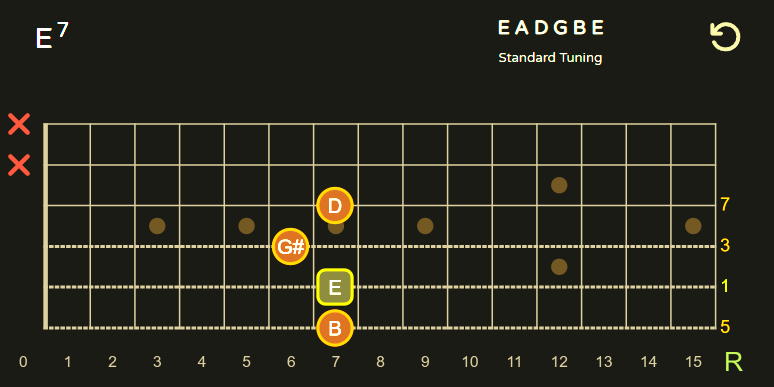
In the above diagram depicting the minimalist E7 chord, the 2nd finger of the left hand alternates between playing the 5th string (note E) and playing the 6th string (note B), while muting the 5th string.
How to Play
As a Bossa Nova
Bossa Nova is actually 2/4, like much Brazilian music, with the root pulse in quarter notes.
The song is played faster on the video (150 BPM) than the audio (120 BPM). The slower speed is somewhat dreary, but easier to play. The faster speed sounds rushed, so I think around 140 BPM sounds best. I seem to find myself playing this song at 136 BPM most often.
As a Samba
Samba is similar to Bossa Nova, but is more complex beat, so it is usually played in 2/4 using 16th notes instead of 8th notes. As a result, the beats per minute are typically half that of Bossa Nova.
- Pro Tools
- DaVinci Resolve
- EZ Drummer 3
- Guitar Pro
Read about how I use these tools to make music videos.
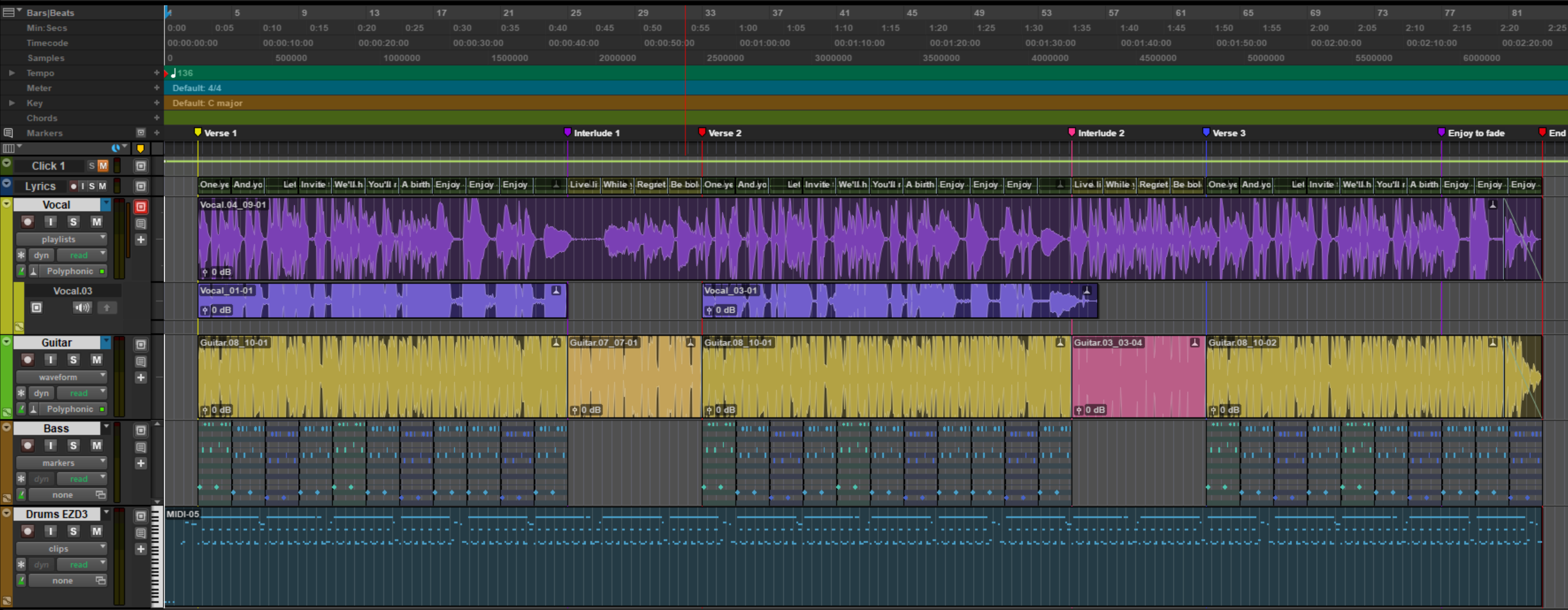
Pro Tools track layout for the longest version.
Change Log
2024-11-26
- Made audio and video recordings at different lengths. This meant removing repeats and entire sections for shorter versions.
2024-11-19
- Added credits at the end
2024-11-18
- Added scrolling lyrics
2024-11-05
- Renamed the synthesizer bass track in
One Year Older_stems_136_bpm.ziptoOne Year Older_stem_136_bpm_alt_Bass.mp3. - Added a different bass pattern, played on a Fender Precision bass guitar, called
One Year Older_stem_136_bpm_Fender Bass.L.wavandOne Year Older_stem_136_bpm_Fender Bass.R.wav.
2024-11-02
- The audio recording was updated at 120 BPM and 136 BPM.
- I totally redid the Pro Tools project.
- Re-recorded the voice and guitar on separate tracks
Planned
- The drum track would be much improved with a human drummer.
About the Competition
“Happy Birthday to You” is the most frequently sung song in the English language, according to the Guinness Book of World Records The Songwriters Hall of Fame says that this song is more popular than any of the works of Bach, Beethoven and the Beatles.
“Happy Birthday to You” generated an estimated $50 million in licensing fees for music publisher Warner/Chappell until a court ruled that the song was in the public domain.
Musicians
You are welcome to perform and record this song at the speed you prefer and in the key you want.
This is copyrighted material. You can earn passive income by recording and performing this song. As it slowly becomes more popular, what is at first a trickle of royalties grows over time into something that is always providing for you.
Stems
Stems are helpful for musicians who need to learn how to play a song. After downloading audio stems, they can play each stem as a separate track, and adjust the volume of each track according to their requirements. For example, a musician might choose to hear just the stem initially for the instrument they play. Once they have learned their part, they might play all the other stems at normal volume but mute the track they had listened to, so they can practice their part while playing along. Wikipedia has additional information.
Audacity is a popular, free, open-source program that can play stems. It allows you to decide which stems to play, and you can adjust their relative volumes.
One_Year_Older_stems_136_bpm_2024-12-21.zipOne Year Older_stems_136_bpm.zipone_year_older_55sec_stems_136_bpm.zipOne Year Older_stems_120_bpm.zip
Sheet Music & Project Files
